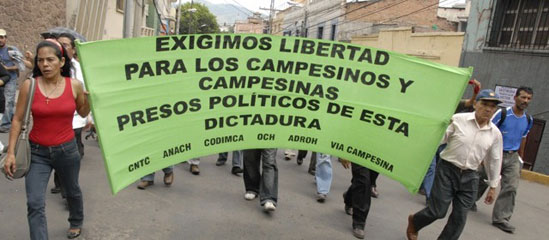End All U.S. Support for Illegal Coup Government
•
Anti-Coup Forces Mark 100 Days of Resistance in Honduras
• Peasant Political Prisoners Declare Indefinite Hunger Strike • Resistance Will Accept Dialogue If Repressive Measures Suspended • Honduras Coup Regime Opens Fire Against Youth and Union Members
End All U.S. Support for Illegal Coup Government
Anti-Coup Forces Mark 100 Days of Resistance
in Honduras
The peaceful resistance against the military coup in Honduras reached its 100th consecutive day of protests on Monday, October 5 and the leaders of the National Front against the Coup d'Etat reiterated they will continue until democracy is restored.
The Front's other objective is to call for a national constituent assembly that draws up a Constitution to establish equity and justice in the country.
At its assembly on October 4 the Front also agreed to stage a new rally in front of the U.S. embassy in Tegucigalpa on Friday, October 9, despite the state of siege decreed by the de facto government on September 27.
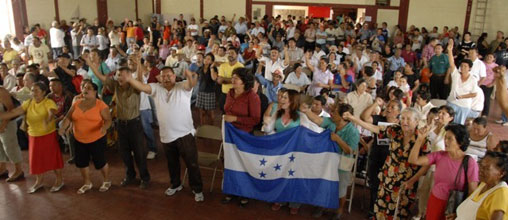
Meanwhile, the massive repression against the Honduran people and their resistance is continuing. The Honduran resistance and human rights organizations have condemned the murder of teacher Mario Contreras, vice principal of the Abelardo Fortín Institute and Antonio Leiva, a leader of the indigenous Lenca people, two members of the resistance said to have been killed by hired assassins.
According to a preliminary report from the Committee of Relatives of Disappeared Detainees in Honduras (COFADEH), Contreras was shot twice in the face about 100 yards from his home by two unknown men on a motorcycle. He was taken to hospital but died shortly after arriving, Telesur reports.
The Center for the Prevention, Treatment and Rehabilitation of Victims of Torture and their Families (CPTRT) affirmed that "according to witness statements provided by relatives, it is presumed that the attacks were perpetrated by hired killers, given that none of the victim's belongings were missing, ruling out the possibility of robbery."
Another member of the resistance front, indigenous Lenca leader Antonio Leiva, was also found dead in Santa Bárbara in the west of the country. According to sources close to the victim, he was kidnapped in the morning and his body was discovered in the afternoon in a village in the area.
COFADEH President Berta Oliva informed the international media that several opposition leaders have received anonymous death threats and her organization fears for their safety.
Among those threatened, she mentioned presidential candidate Carlos Reyes, agricultural leader Rafael Alegría, labor leader Juan Barahona, left-wing Deputy Silvia Ayala and human rights activist Andrés Pavón.
In related news, President Zelaya, who remains confined within the Brazilian embassy in Tegucigalpa, in an October 5 phone interview with Telesur expressed that his restoration to office is not negotiable and that the desire of America and Europe is a flat no towards military coups.
"We want to tell the international community that in the 21st century, democracy is an asset of globalization that goes beyond the border of any country; that whoever tries to break the democratic system and supplant the people's sovereignty will be rejected, as has this putschist regime, not only by the people but also by the whole international community," Zelaya said.
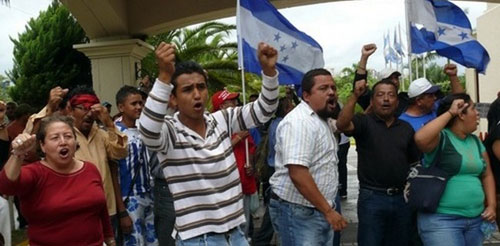
Zelaya also clarified that he has not proposed a constituent assembly during his administration, only an opinion poll on whether to hold one and in which he would not have had any role. It would be the next president who would oversee such an assembly if so decided by the people, to debate the problems of the Honduran Constitution.
In an interview with CBC Radio broadcast on October 6, President Zelaya stated that the embassy continues to be surrounded by a military encampment. Inside, some 40 people, including foreign journalists, remain with the president in conditions he described as a concentration camp. Regarding the reasons for the coup he reiterated that it was not because of any illegality on his part, but because the oligarchy "were unable to maintain their strategy of deception and lies against the people of Honduras, and that's why they had to launch their coup d'etat. If I had truly faced some sort of legal problem, had I committed some wrongdoing, it would have been easier to take me to the courts than to launch a coup d'etat. The coup d'etat proves that they used force in order to avoid a debate that they obviously lacked the courage to face."
In regards to the de facto regime's attacks on progressive media and suspension of civil rights, Zelaya remarked, "For me the coup d'etat is a crime. The repression proves that the coup d'etat does not have popular support. And the crackdown on civil liberties, press freedom and the closure of media outlets proves that a dictatorship is being entrenched. A dictatorship that has yet to be defined as such by the international community."
An Organization of American States mission to negotiate between the coupists and President Zelaya was expected to arrive on Wednesday, October 7.
(Agencia Bolivariana de Noticias, Prensa Latina, Granma International)
[TOP]
Peasant Political Prisoners Declare Indefinite Hunger Strike
Note from HondurasResists: To understand the struggle of the peasant political prisoners it is important to point out that the National Agrarian Institute they were occupying and defending from the coup government is the Honduran institution which houses the land titles that had been attained by small rural farmers and communities through years of struggle, many of which were finally granted under the Zelaya administration, angering the powerful landholders who are responsible for the coup and now want to halt and reverse the process of land reform in Honduras.
The 38 peasants who were sent to prison declared themselves on hunger strike at noon on Thursday [September 1] demanding a fair trial and respect to their personal integrity, declared Ramòn Adalberto Díaz, who was named the spokesman of the strikers.
On Wednesday September 30, the National Agrarian Institute (INA) was assaulted by police who came breaking doors and windows and captured 55 people, among them two minors and six women. From them the two minors were send to the Renaciendo internment center and 38 men to the National Penitentiary. All of them had been participating in a peaceful occupation of the institution since the 28th of June when the coup d'etat against President Manuel Zelaya Rosales took place, carried out by military in collusion with the powerful groups of Honduras.
In a visit carried out by the Committee of Families of the Detained and Disappeared in Honduras, COFADEH, on Thursday evening, the organization confirmed the physical conditions of the cells where they were before at Metropolitan Police District No. 1, where the detained stated that they were in inhumane conditions, that they hadn't been allowed to bathe since their capture, that several were suffering health problems and are sleeping overcrowded on the floor, so much so that not every one fit on it when they all tried to lay down and many were standing with no space, all of which are human rights violations.
They stated that they are taking the measure of a hunger strike because they consider themselves defenseless before a judicial system that doesn't allow them to defend themselves equally and that has unjustly accused them of the crime of Sedition without any corresponding evidence.
Due to the overcrowded conditions they are in, the chief of the Metropolitan Police José Ventura Flores Maradiaga, asked before the judge for the detained to be transferred to the National Penitentiary. The request was accepted and the peasants were sent last night to that jail, where they will be for six days according to law, until the next hearing that will take place Tuesday of next week [today, Tuesday 10/6], where the Judge can send them to prison for longer or give them provisional freedom.
As of the declaration of the hunger strike there are eight sick [...].
These 38 political prisoners are in addition to three more: the teacher Agustina Flores López, Antonio Porta Alvarez (of Spanish nationality) and Santos Reynaldo García who were sent to prison by another judge for the crimes of sedition. There are more than 40 people who are not in prison but have also been accused of sedition and damages and are facing trials that have developed in complete inequality violating international agreements and Human Rights treaties and the Honduran Constitution. [...]
[TOP]
Resistance Will Accept Dialogue If Repressive Measures Suspended
On Monday, October 5, the National Front against the coup d'etat in Honduras ratified its decision to participate in a process of dialogue, with the purpose of finding a solution to the crisis unleashed by the military coup perpetrated last June 28, insofar as it does not take place under repressive measures.
Prensa Latina reports that the Front, through an official communiqué, maintains that dialogue is the appropriate channel for resolving differences. The communiqué added, "As long as these measures of force are maintained, an atmosphere favorable for productive dialogue does not exist,"
Nevertheless, the Front put forward certain demands so that a sincere dialogue can take place, in particular the withdrawal of the September 27 decree that suspended constitutional guarantees, as well as the demilitarization of the area of the Brazilian embassy, where the constitutional president, Manuel Zelaya, has taken refuge.
Likewise, the Honduran people demand respect for freedom of expression with immediate restoration of the operation of Radio Globo, television Channel 36 and the other media that have been shut down or censored, as well as demanding an end to the persecution of journalists and alternative networks.
The text also demands the immediate liberation of the political prisoners detained during the control by the de facto government.
Furthermore the alliance of popular forces maintains that the dialogue must result in the departure from power of the military-civil dictatorship, Zelaya's return to power without conditions, immediately and with security, and the definition of mechanisms for convoking a democratic, inclusive and participative national constitutional assembly.
The Front also calls on all the local, municipal, departmental and regional fronts to intensify the struggle for all demands with mobilizations and activities throughout the country.
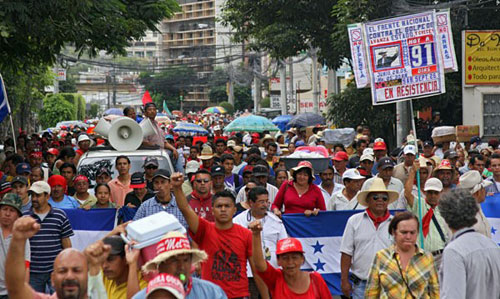
(Translated from the original Spanish by TML Daily)
[TOP]
Honduras Coup Regime Opens Fire Against Youth and Union Members
The Honduran people have set an example for people throughout Latin America through three months of steady resistance to the coup in their country. But there are powerful groups within Honduras and abroad organizing to neutralize this unprecedented force and block the resistance from growing in strength and numbers. These groups above all seek to prevent the nation from carrying out a Constitutional Assembly to modify the outdated constitution. Along with the reinstatement of the elected President Manuel Zelaya, this demand is central to the popular movement against the coup as a necessary tool to bring the country and its people out of poverty.
In this Special Report, Tegucigalpa reporter Dick Emanuelsson and photographer Mirian Huezo Emanuelsson chronicle the terror and repression unleashed by the coup to maintain power. Despite promises to lift the executive decree that imposed a state of siege, the violence continues.
These are firsthand accounts from the victims of the strategy of force being employed by the coup. All were wounded by security forces since the return of Zelaya on September 21. This strategy has only intensified, despite talk of an official dialogue and being largely frustrated by the recent visit of the Organization of American States (OAS). Even as the OAS ministers and other dignitaries were meeting on October 7 in Tegucigalpa to promote dialogue, the coup and armed forces again attacked peaceful demonstrators in the streets.
* * *
The pain is intense and tears stream down the sun-browned face. Mauricio Maldonado, 18, was shot by the police when he went out to the corner store to buy a bag of churros. It was 8:30 at night on September 24 and the curfew had been imposed since 5 in the afternoon the previous day in the combative neighborhood of La Cañada, in the capital city of Tegucigalpa. He is an example of the repression that is using more bullets and beatings to control rebellious sectors of the population.
Maldonado says that the people of La Cañada are not happy with the June 28 coup d’etat. La Cañada is a poor neighborhood of mostly teachers. The teachers have been at the forefront of the Honduran uprising against the coup due to the union leadership which from the first day began marching and demonstrating in the streets and striking for a return to democracy. In the last weeks, they have been attacked by security forces and many have been arrested.
The increased violence against people living in extreme poverty in urban neighborhoods in Tegucigalpa, San Pedro Sula and other Honduran cities began with Zelaya’s return to Honduras. At 4 pm on Monday, September 21 — just hours after Zelaya arrived in Tegucigalpa, the coup regime imposed a round-the-clock curfew. The Honduran people were held hostage in their own homes for more than 38 hours. The curfew was lifted for seven hours on Wednesday September 23 at 10 A.M. During these hours, tens of thousands of residents in the neighborhoods of Tegucigalpa and San Pedro Sula rebelled until they were able to take control of several police posts.
It is typical for the poor of these neighborhoods to buy their daily groceries at local corner stores. That is why there was so much rage against the decision to impose a curfew. It not only violates the constitution but it also leaves people stranded in their houses without food. It was received with a fury rarely seen before in Honduras. The decision reinforced the rejection of the coup leaders and enhanced the political consciousness of the people.
We entered another room in the hospital where we found Junior Adalberto Rodríguez, 18 years of age, a young man among the thousands that go out to demonstrate daily in the resistance marches. The youth of the popular neighborhoods often prove difficult for the resistance leadership to control because their rebellion draws not only on their opposition to the coup but also on a deep resentment against a society that represses youth instead of offering education and employment opportunities. He is sitting up in bed staring at the wall. He and six friends were shot at on September 22 during the curfew.
The youth themselves say that to be young in Honduras is considered a crime today. The soldiers and police see the young people as a subversive group and would rather strike out against them to neutralize their rebellion than see them organize in the resistance.
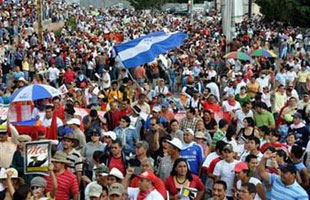 Mario Valladares, 47, of the neighborhood of Israel Sur, is another victim we came across in a room on the fourth floor of the Hospital Escuela. The hospital is full of victims of a regime that has been condemned by the entire world. “I went out at 10:00 in the morning when two patrol cars appeared. I do not deny that I am part of the Resistance. Because I am going to defend my people. With things the way they are now, a lot of times people bow their heads but the people have awakened. And I say with pride that I will die for my people if necessary,” Valladares tells us.
Mario Valladares, 47, of the neighborhood of Israel Sur, is another victim we came across in a room on the fourth floor of the Hospital Escuela. The hospital is full of victims of a regime that has been condemned by the entire world. “I went out at 10:00 in the morning when two patrol cars appeared. I do not deny that I am part of the Resistance. Because I am going to defend my people. With things the way they are now, a lot of times people bow their heads but the people have awakened. And I say with pride that I will die for my people if necessary,” Valladares tells us.
“I was forming a resistance group when the patrols arrived and one of them took out a pistol. ‘Why are you drawing your gun, what’s going on? We are Hondurans, we are being peaceful, we do not have arms, sticks or rocks,’ we told them.
“‘There’s no problem,’ they answered us. But when they left, some boys started yelling slogans and they did not like that. When I saw that one of them aimed a rifle, I threw myself on the ground but it was too late, I was already shot along with six other friends.” They were in the streets during the time the curfew had been lifted. In spite of this, the men were savagely attacked with high-caliber firearms.
“Do you know why they lifted the curfew? To kill the people! Because the order is simply to shoot people and the order comes from above. I know because I was in the army. A lower-level soldier does not shoot like that without an order from above.”
The same morning and hour that Mario Valladares and his six friends were shot, union leader Jairo Sanchez was shot by uniformed officers under General Romeo Vázquez. The security agents of the National Department of Criminal Investigation (DICN) did not say a single word, they just opened fire on the crowd protesting against the dictatorship in the neighborhood of San Francisco. The curfew had been lifted when the demonstrators were attacked.
“Unfortunately, they shot our companion in the left cheek, leaving him badly wounded,” says Abel Morales, another leader of the National Union of Workers of the Professional Training Institute (SITRAINFOP) that has nearly a thousand members in Honduras.
As we were interviewing him in the beautiful park of the Institute, union members were holding a Marathon Event to raise funds for Sánchez’s operations and treatment, which costs half a million lempiras or approximately $27,000. The attempted assassination has left the union leader an inch away from death. “We are holding this Marathon in all of the local sections all over the country to support our fellow union member. We really appreciate all the support we’ve received from unions all over the world.”
Morales explains, “Conditions in Honduras are tough and we the union leaders are very exposed in this situation. At 6 in the afternoon on Wednesday, a contingent of four patrol units with a total of 60 officers and 60 patrolmen entered the neighborhood where I live. They come into many neighborhoods, not just mine, shooting, raiding homes, breaking down doors, taking a few members of the resistance. They are watching us, above all the union leaders who are at the forefront of the resistance that is known throughout the world as a peaceful movement. But the police and the army come and they repress us. The situation is becoming difficult and international organizations must get involved in the issue.”
[TOP]
Congressional Members Call on President Obama to Publicly Denounce Use of Violence and Repression of Honduran Protestors
Fifteen of Congress wrote to president Barack Obama on August 7, 2009, concerning repression of protesters and media in Honduras. They called on him to publicly denounce “the use of violence and repression of peaceful protestors, the murder of peaceful political organizers and all forms of censorship and intimidation directed at media outlets,” in Honduras. This occurred prior to the great increase in repression by the coup government since elected President Manuel Zelaya returned to Honduras, September 21. Obama has not yet responded to the Congresspeople and he has not denounced the violent repression, assassination of resistance leaders and the broad attack on rights imposed by the coup government since the June 28 military coup. We reprint below the August letter to Obama.
Letter to Obama
Dear President Obama,
As you know, on June 28th, 2009 a military coup took place in Honduras. The democratically elected president, Manuel Zelaya, was kidnapped by soldiers and flown to Costa Rica in his pajamas. In the hours that followed, media outlets favorable to the deposed president were censored, demonstrators were repressed and members of the presidential cabinet were detained or went into hiding.
We appreciate very much that you and members of your administration have strongly condemned the coup, and have supported the efforts of the Organization of American States and Costa Rican President Oscar Arias to resolve the crisis. We also believe that the concrete measures that the administration has taken in response to the coup — including the suspension of $16.5 million in military aid — have sent a strong message to Honduras’ de facto regime.
We are, however, increasingly concerned by the many reports of flagrant human rights violations that are being committed under the current de facto regime. Peaceful protests have been violently repressed, and protestors have been shot by the military, with at least one killed, and many wounded. The media has been censored, independent radio and TV stations have been shut down, political organizers have been detained and intimidated and fundamental civil liberties have been suspended. These abuses have been documented and condemned by the Inter American Commission for Human Rights and organizations such as Human Rights Watch, Amnesty International, the Committee to Protect Journalists, Reporters Without Borders.
The respected Honduran Committee for the Relatives of the Disappeared Detainees (COFADEH, by its Spanish Initials) recently released an alarming report documenting the many critical injuries and even deaths that have resulted from police and military repression, the hundreds of arbitrary detentions of peaceful citizens, the attacks perpetrated against media outlets that have criticized the coup and other grave violations of human rights.
Meanwhile, the Miami Herald and other news outlets have reported on the media “blackout” that has occurred and the closure of media outlets and intimidation of journalists that have spoken out against the coup. It seems clear that tight control of the media landscape is seen by the regime as a necessary complement to police and military repression if they are to maintain their grip on power.
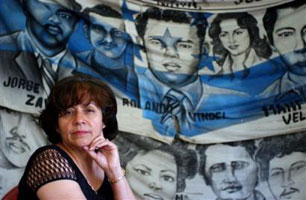 In the words of COFADEH director Bertha Oliva, “ the last few days have been an uncanny repeat of atrocities that we thought were left behind in the 1980s: forced detentions, murder and violent repression of peaceful protesters, media censorship and suspension of constitutional rights.” Though human rights organizations have condemned these violations, Oliva states “the stifling of dissent has only intensified inside the country.”
In the words of COFADEH director Bertha Oliva, “ the last few days have been an uncanny repeat of atrocities that we thought were left behind in the 1980s: forced detentions, murder and violent repression of peaceful protesters, media censorship and suspension of constitutional rights.” Though human rights organizations have condemned these violations, Oliva states “the stifling of dissent has only intensified inside the country.”
It is this increasingly alarming situation that compels us to urge you to take further action. In the past, as you have pointed out, our government has sometimes associated itself with regimes whose actions clash with our principles, and this is especially true in Honduras where — according to both soldiers and victims interviewed by the Baltimore Sun and other U.S. newspapers -- the CIA and other U.S. government agencies were allegedly involved in training the death squads that carried out extrajudicial killings and torture in the early 1 980s.
It is precisely in light of this unfortunate history that the words of the president of the United States can have a resounding impact in Honduras today.
Furthermore, over the weekend of July 18 and 19, the talks mediated by President Arias seemed to break down. President Zelaya agreed to all the conditions proposed by President Arias, and the de facto regime, which has always been clear that they will reject any compromise which involves President Zelaya’s return, rejected the Arias proposals.
We therefore urge you to publicly denounce the use of violence and repression of peaceful protestors, the murder of peaceful political organizers and all forms of censorship and intimidation directed at media outlets.
Finally, we urge you to take further measures against the de facto government. The State Department should fully acknowledge that a military coup has taken place and follow through with the total suspension of non-humanitarian aid, as required by law. Even more importantly, we ask that you instruct the Treasury Department to freeze the bank accounts and assets of individuals involved in the coup, and deny them entry into the United States. We believe that these measures, which would have no adverse effect on the people of Honduras, could be effective in exercising the pressure needed for the de facto government to abandon its uncompromising stance.
Sincerely,
Raül Grijalva, Arizona [TOP]
Mike Honda, Barbara Lee and Linda T. Sánchez, California
Jesse L. Jackson Jr. and Jan Schakowsky, Illinois
William Delahunt and James McGovern, Massachusetts
John Conyers, Michigan
James L. Oberstar, Minnesota
José E. Serrano, New York
Dennis J. Kucinich, Ohio
Chaka Fattah, Pennsylvania
Sheila Jackson Lee, Texas
Donna M. Christensen, Virgin Islands

